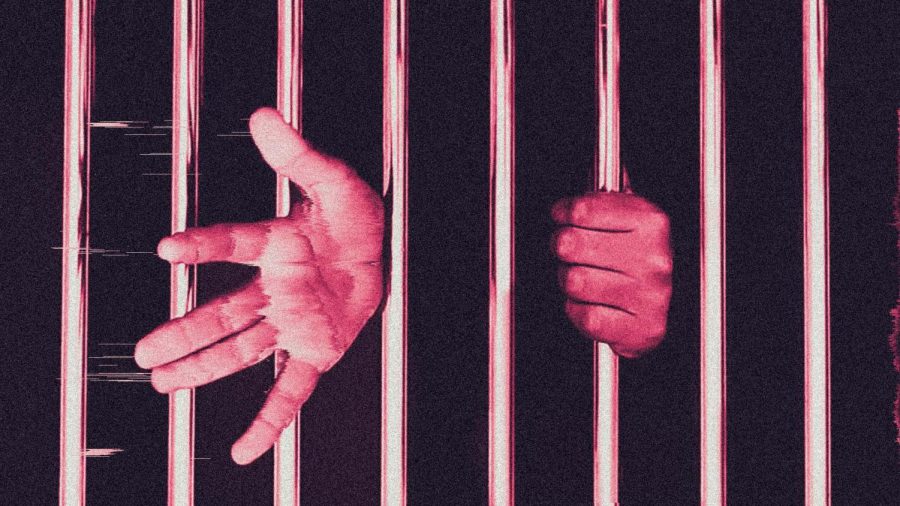Cushman & Hibben: Expand Compassionate Release in Utah
(Graphic by Sydney Stam | The Daily Utah Chronicle)
March 23, 2022
The federal government and most states have compassionate release programs. These allow people with a compelling reason to end their sentence early, often to die with dignity or be in a safer environment. However, in 2021, 19 Utah prisoners were denied compassionate release and five died before even completing the long and tedious compassionate release program.
During the pandemic, Utah worked to decrease prison populations to curb the spread of COVID-19 in jail facilities. However, despite one-third of Utah’s prisoners who died of COVID-19 seeking compassionate release, our state did not increase compassionate releases. This year, the Department of Justice has loosened some restrictions on compassionate release federally. The deaths of Utah prisoners seeking compassionate release during the pandemic illuminated why Utah needs to utilize compassionate release more to make our justice system more humane.
The Limited State of Compassionate Release
After serving 31 years in prison, Kent Clark suffered from moderate to severe dementia, other health conditions and severe pain. If released, he likely couldn’t commit a crime because of these health conditions. He’d be a minimal threat to public safety and receive better healthcare. However, the warden at Clark’s prison denied his request for compassionate release, despite his conditions.
Clark’s experience is the rule rather than the exception. Only six percent of federal applicants for compassionate release are approved. In part, this frequent denial results from stringent requirements. Most compassionate release programs require a prisoner to be close to death and a medical professional to attest to a likely time of death. However, even if a prisoner meets those requirements and others, decision-makers like wardens, parole boards, etc. can still deny a prisoner’s release.
This frequent underutilization seems increasingly cruel when we acknowledge the deeper inequities in our prison system. Our criminal justice system has racial inequality built into it. The Sentencing Project found that: “Black Americans are incarcerated in state prisons at nearly 5 times the rate of white Americans.” They also reported that people who are Latinx are incarcerated at 1.3 times more than non-Latinx white Americans. Many prisoners also experience poverty. Two-thirds of prisoners reported earning less than $12,000 a year before going to jail and currently, one million Americans are imprisoned for offenses directly related to their poverty.
When we fail to utilize compassionate release, we deny compassion to people of color and people in poverty, further deepening the inequity those groups already face. Knowing crime is often precipitated by those inequalities doesn’t excuse the crime, but it should encourage us to lead with compassion.
The State of Humane Justice Globally
The U.S. falls behind other countries in our criminal justice system. Our incarceration rate is more than five times the rate of most other countries, even with similar levels of crime to other industrialized states.
In Europe, equal or sometimes lower crime rates occur due to generally shorter sentences, temporary release programs, and easier compassionate release programs exist. Norway stops most prison sentences at 21 years, and yet has a lower crime and recidivism rate than the U.S. One U.S. study in 2017 found that decarceration does not increase rates of crime and that “doing more time increased the chance of rearrest within four years.” These examples help demonstrate that the U.S.’s aggressive and unnecessary approach to incarceration needs reevaluating.
The E.U. states, “member States should ensure that every detainee is afforded the basic human dignity of dying outside of prison.” It’s a human rights violation to deny compassionate release to those who desperately need it.
Compassionate Release in Utah
Utah does not grant compassionate release frequently. The Utah Parole Board didn’t increase compassionate release greatly in 2020 or 2021, even as prisoners were five times more likely to die from COVID-19 than the rest of Utah.
Utah spends millions of taxpayer dollars on criminal justice. Despite our resources, Utah’s prisons are infamous for delayed and negligent care and expensive health care costs, and state legislators found “systemic deficiencies.” Prisoners suffering from physical ailments and mental health conditions consistently receive untimely care. Denying them compassionate release traps them in a decaying system that cannot meet their health needs. Elderly patients and those with chronic medical conditions can cost up to three times more than other prisoners. Utah could save some funds by implementing compassionate releases more regularly.
Compassionate release programs could reduce Utah’s extremely high rates of recidivism. 46% of Utah’s prisoners return to prison within three years, proving that prison time does not discourage crime. In comparison, federal prisoners in the compassionate release program had a recidivism rate of 3.5%. Reducing recidivism would not only help limit our spending on prisons but also diminish crime.
Congress created compassionate release to recognize the importance of mercy in our justice system. It serves as a necessary opportunity for prisoners who have already served much of their sentence to get proper medical treatment. Forcing prisoners behind bars no matter their ability to serve their sentences is inhumane and hurts Utah’s finances and overall wellbeing. Our prisons reflect the values of our state and denying compassionate release to persons who need it is not the Utah way.









